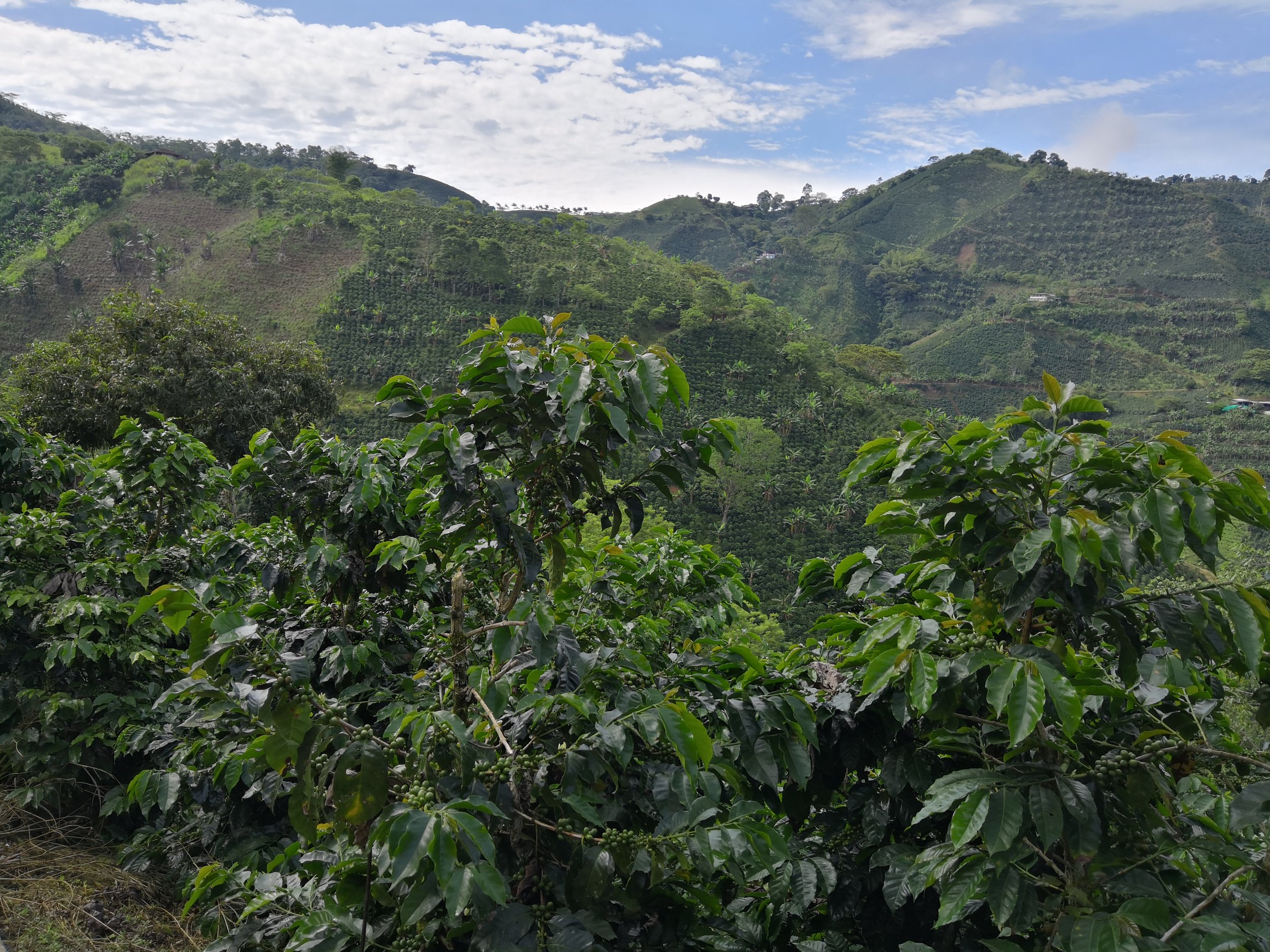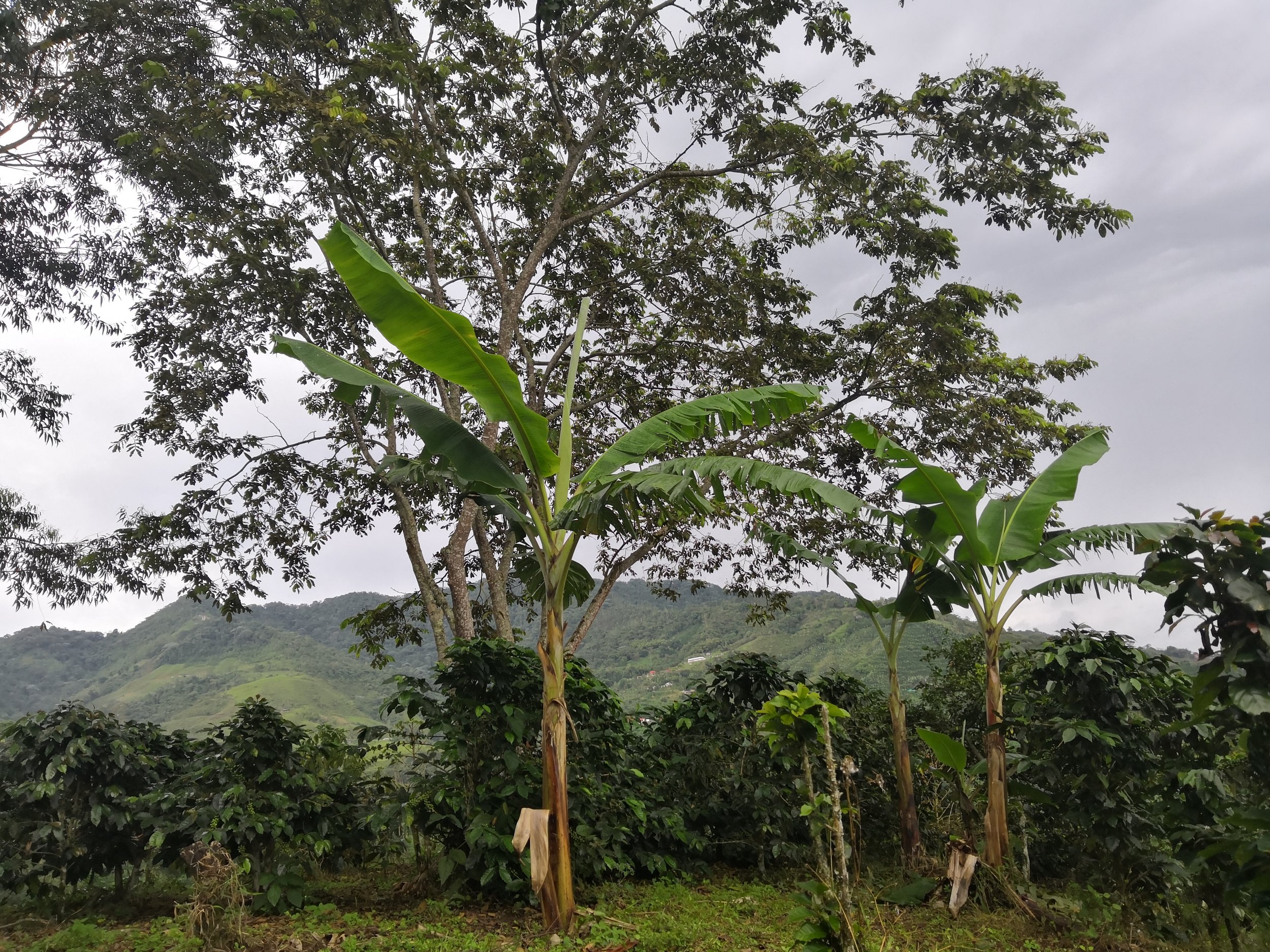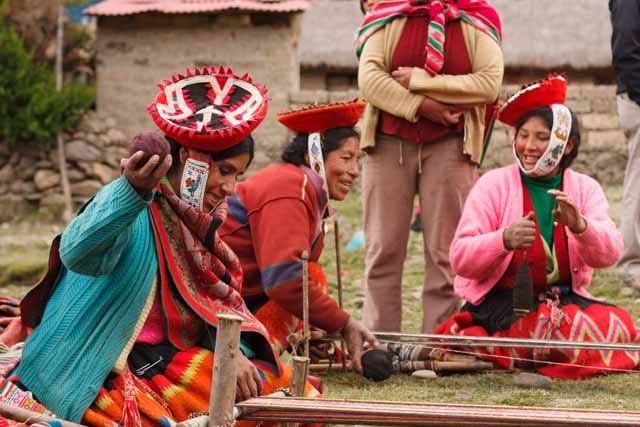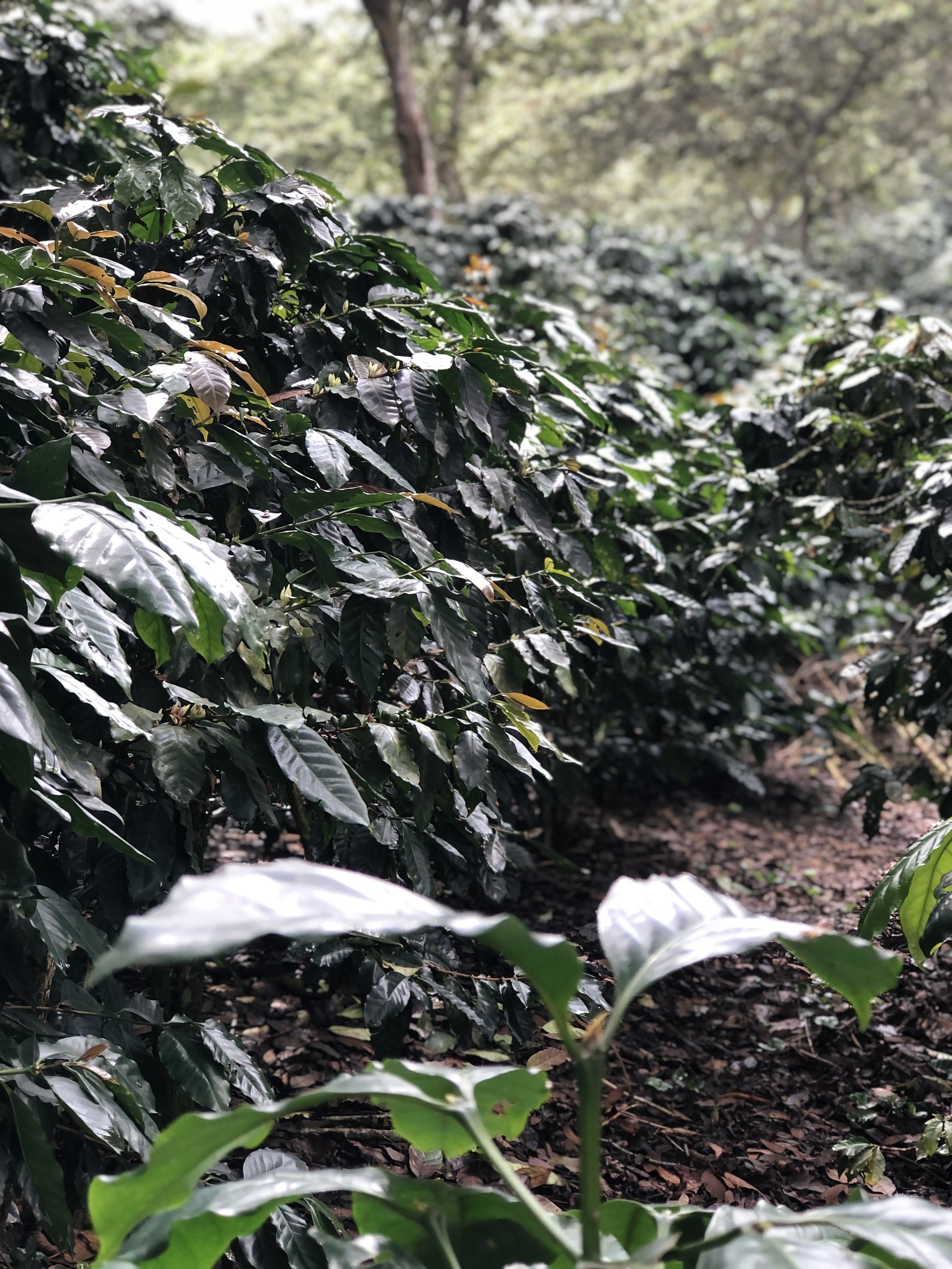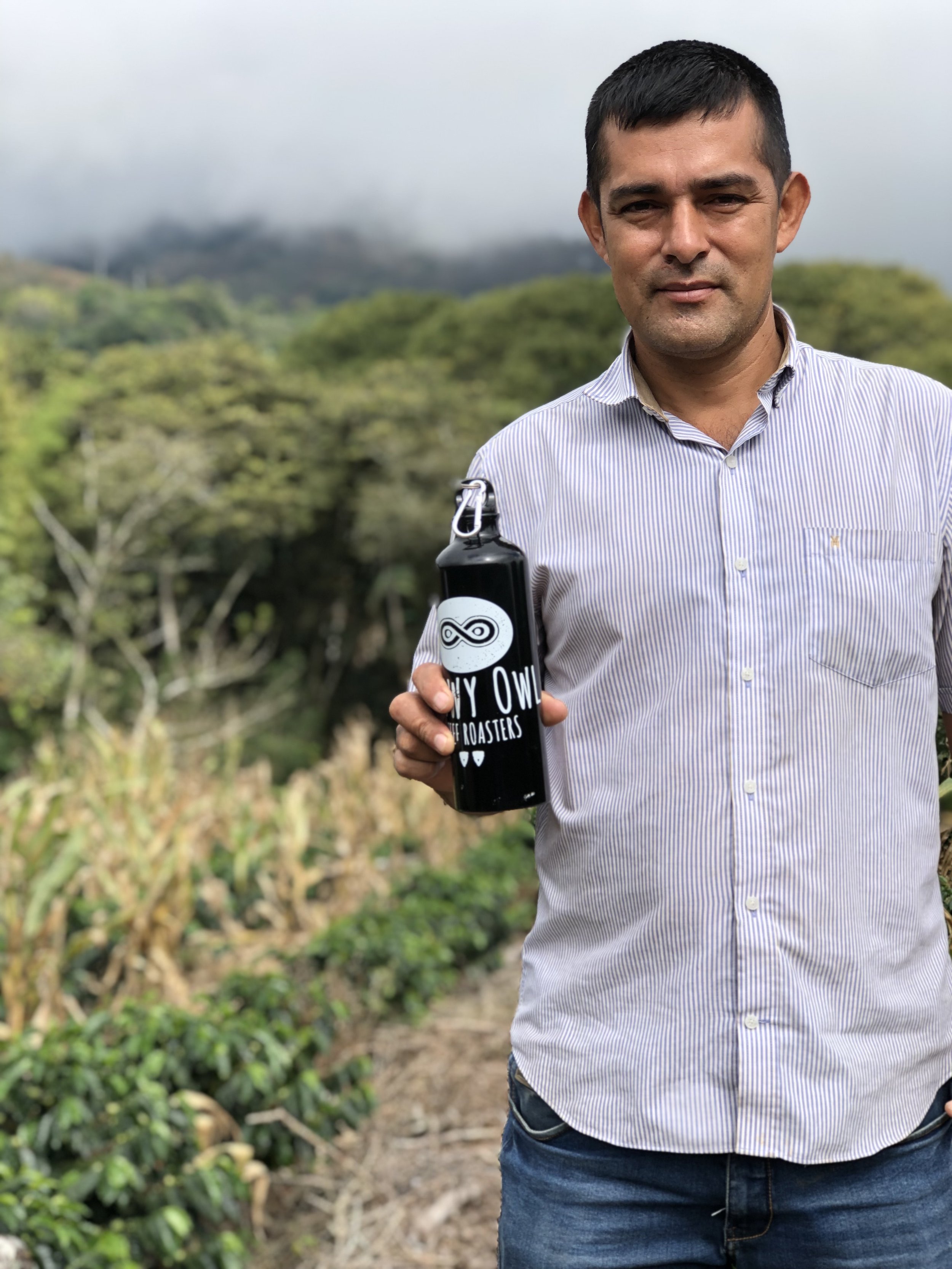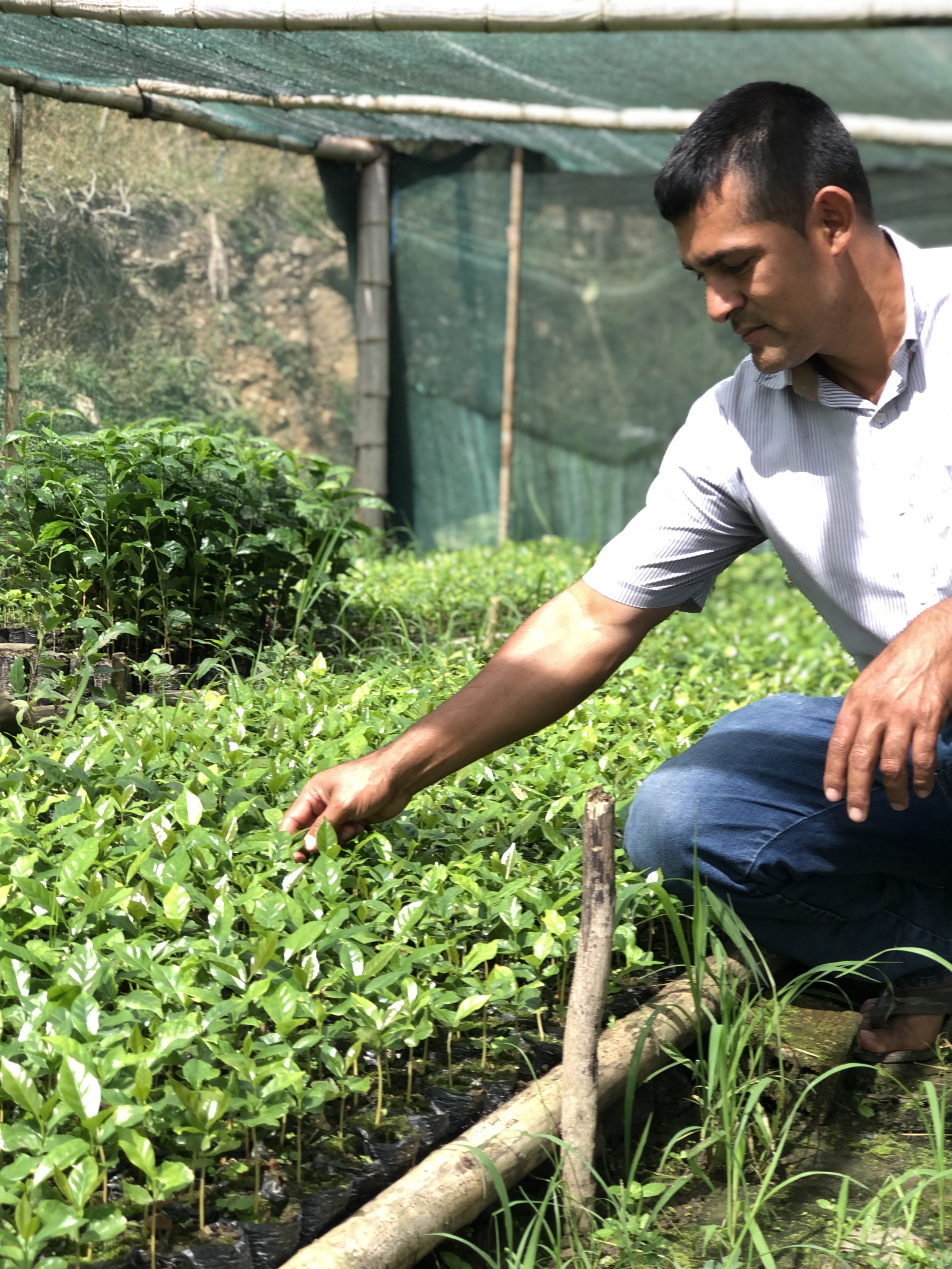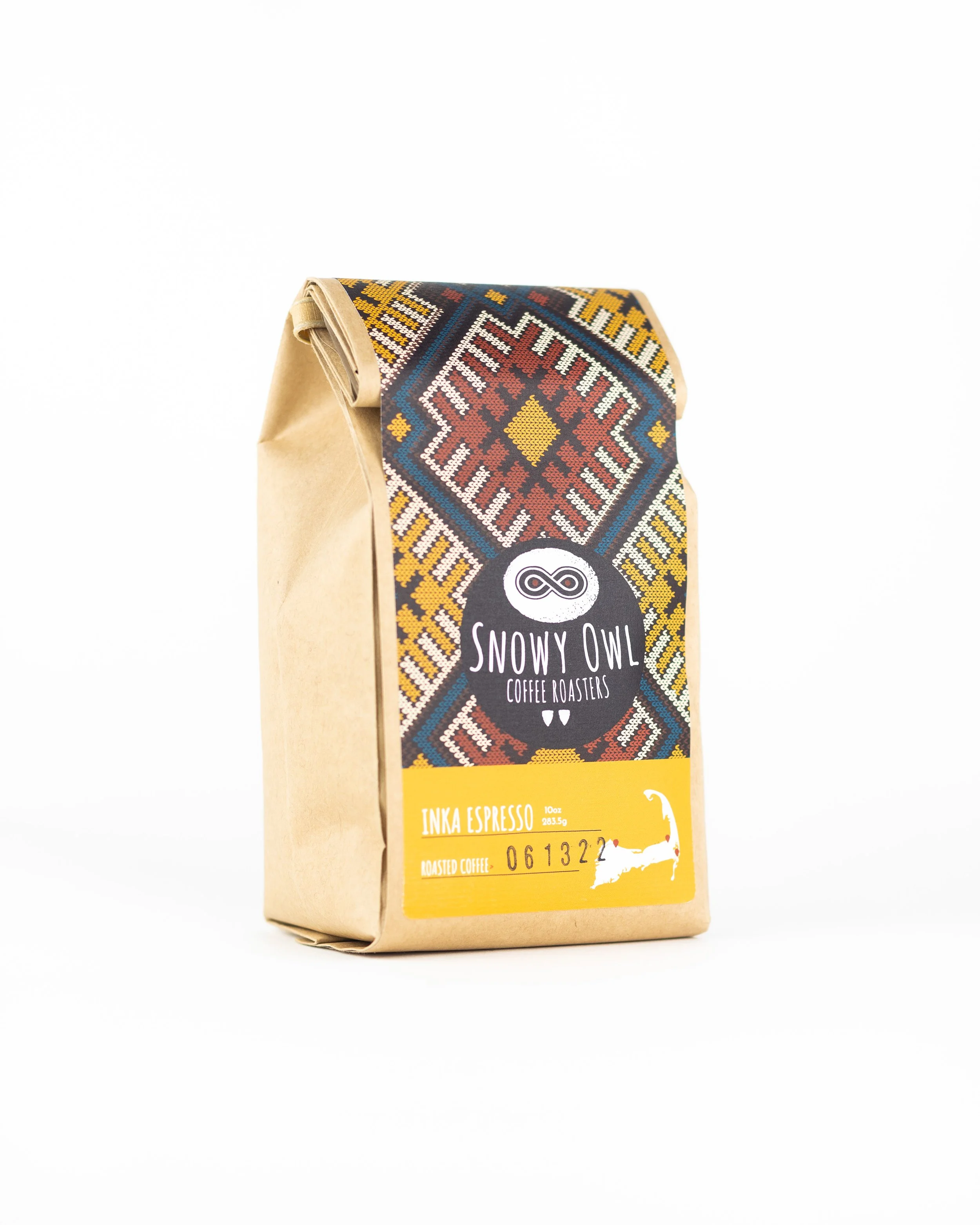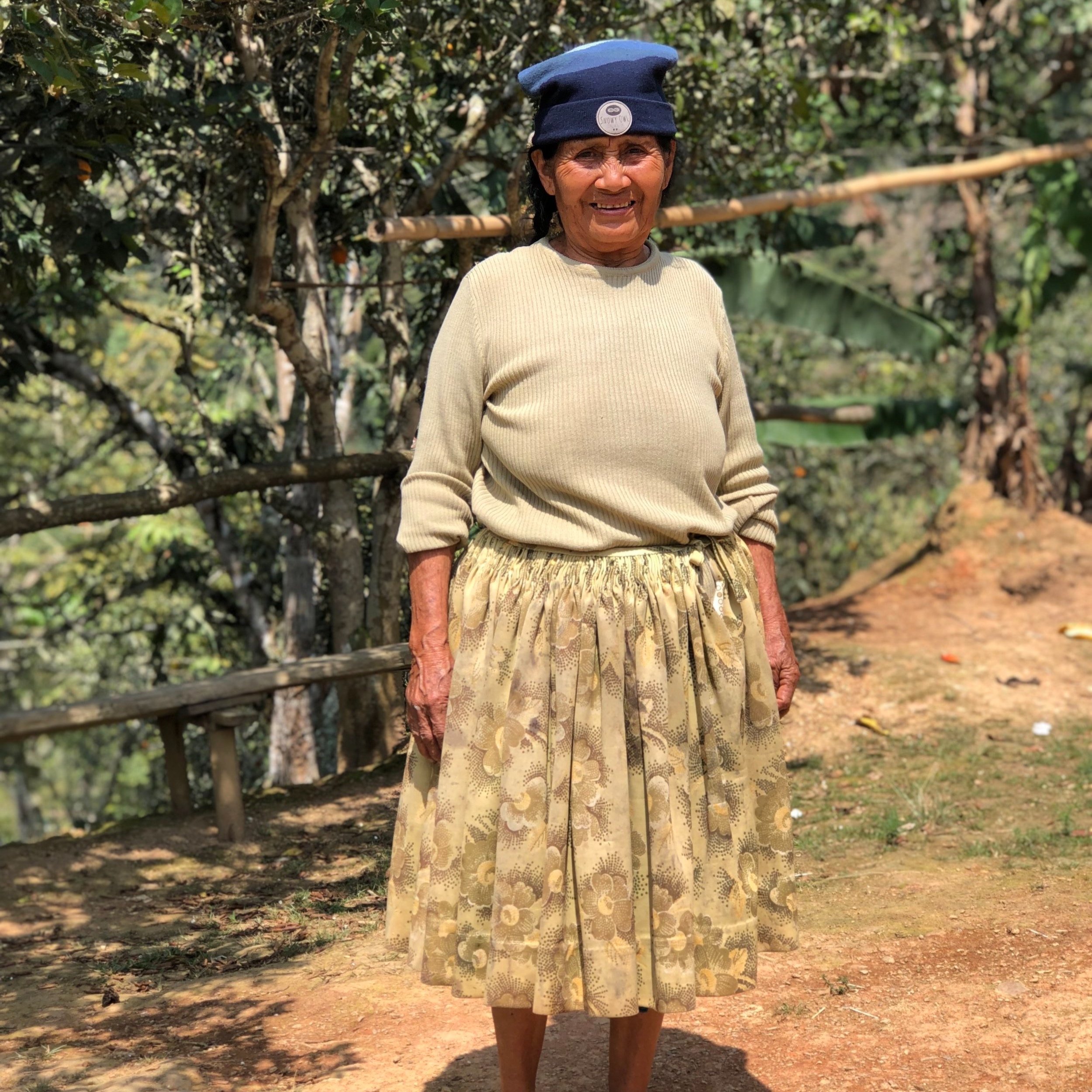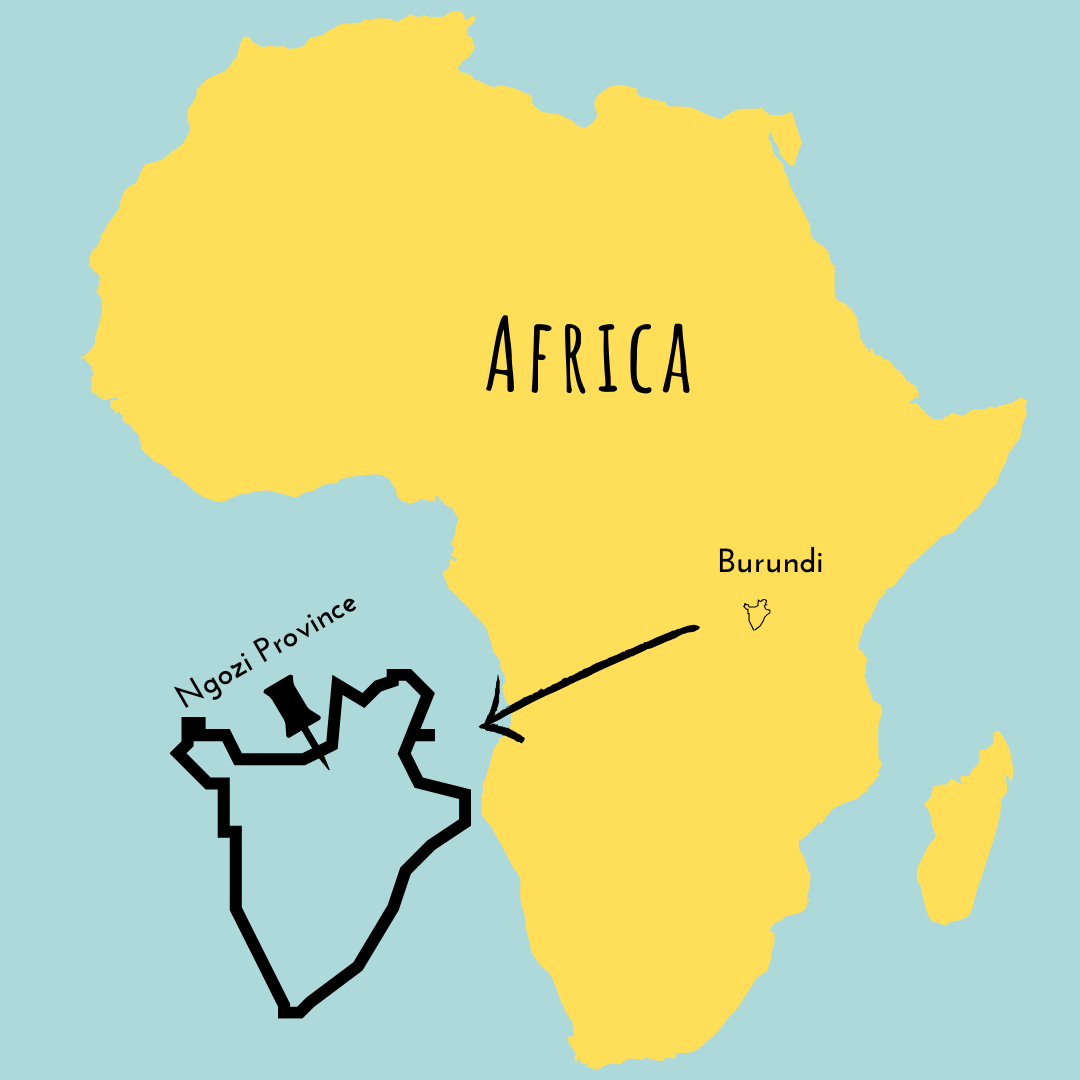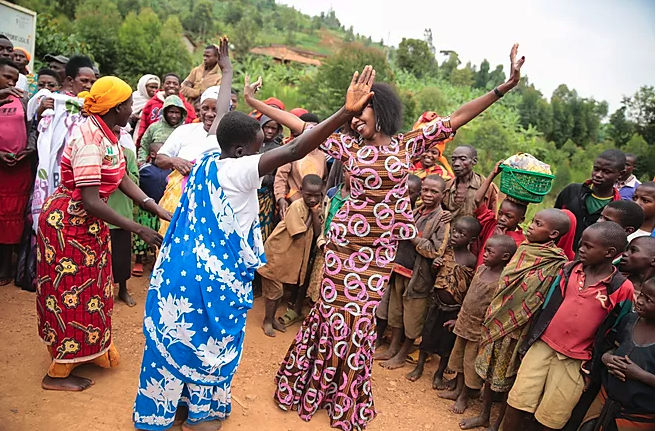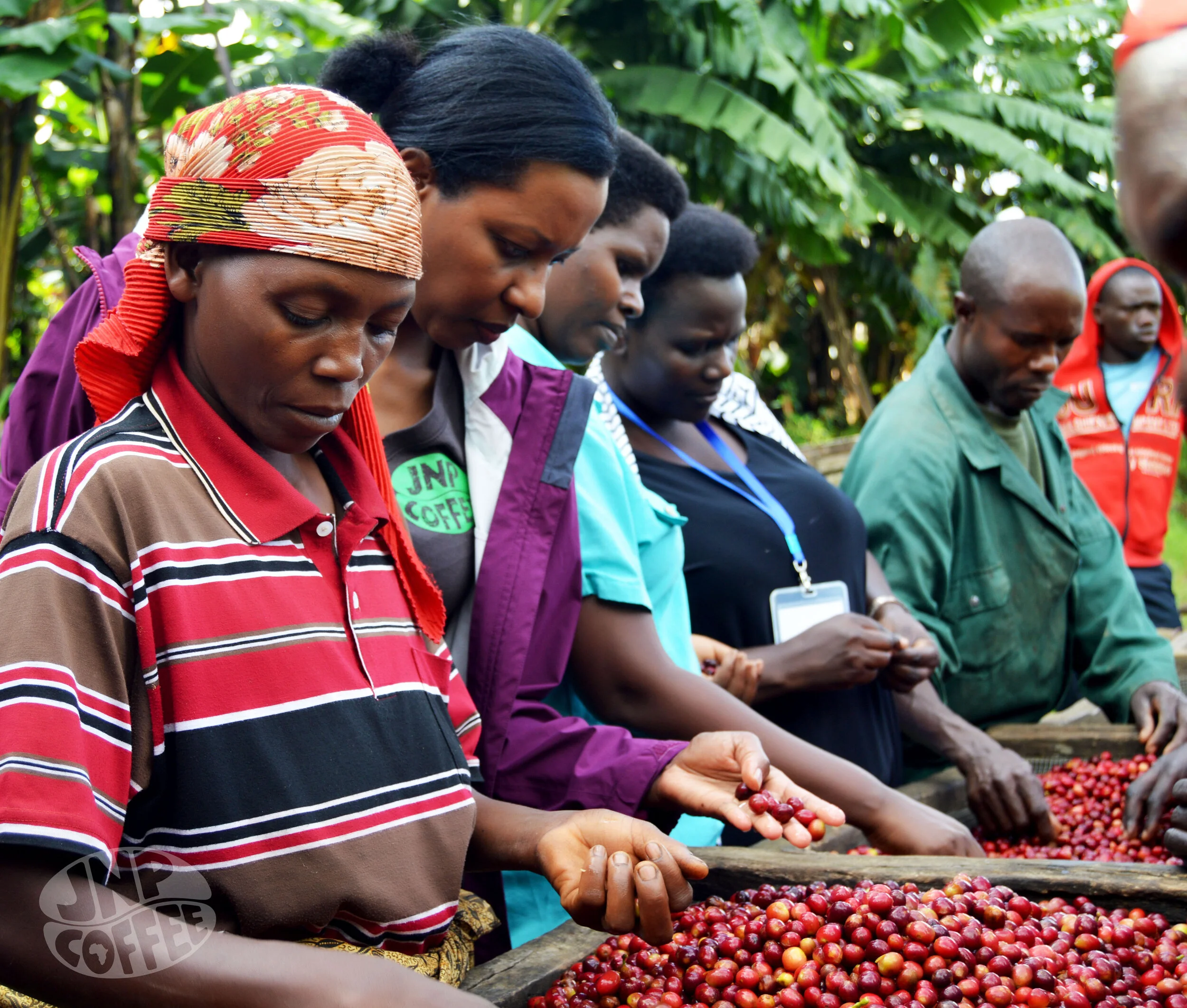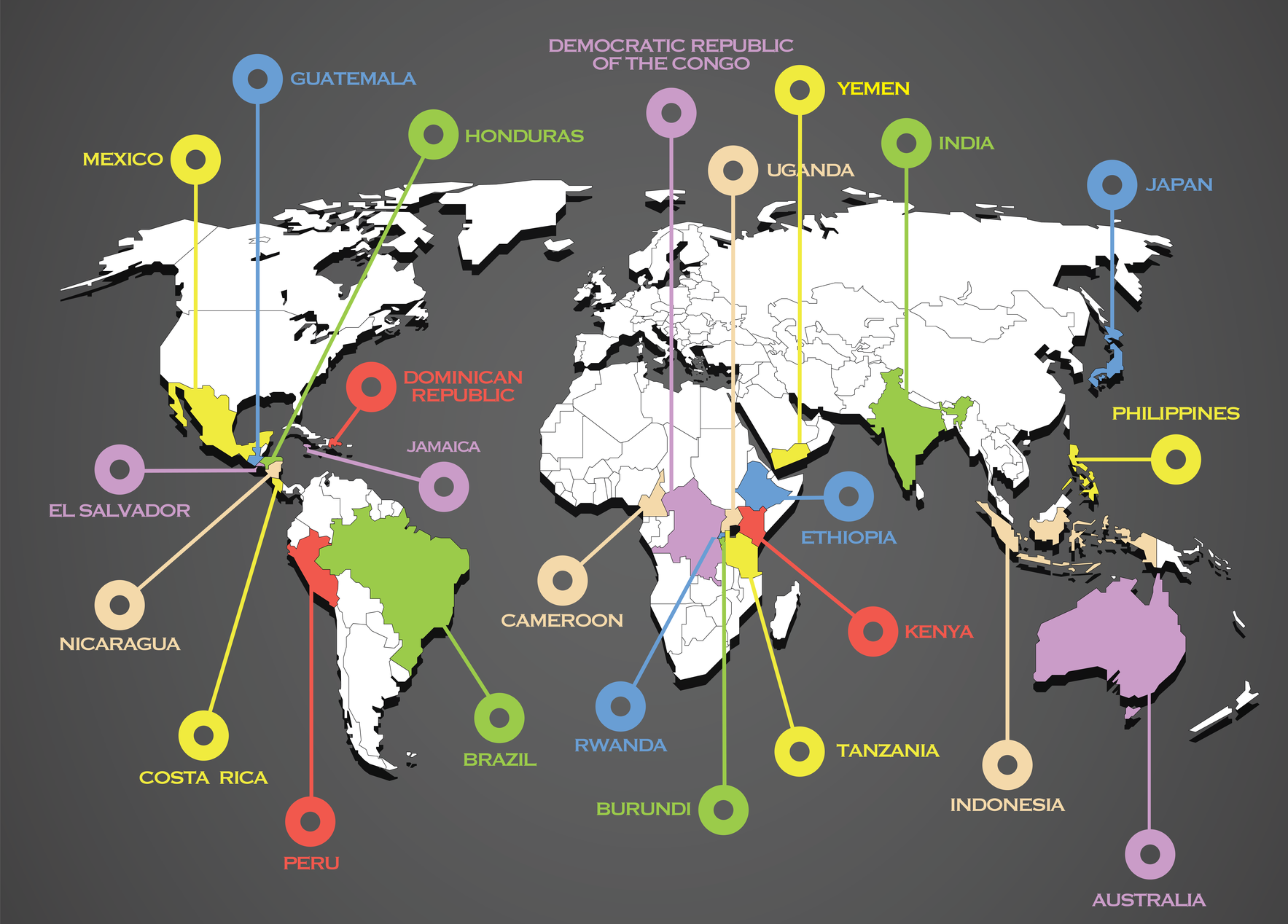Producer spotlight: A conversation with Ana Mustafá from LaReb
Introduction
We started working with La Real Expedición Botánica (LaReb) in 2021 in the hopes of forming a direct, long term relationship for our future Colombian coffees. We were most compelled by LaReb’s diligence, honesty, and motivation to create market access for coffee producers who don’t feel represented by the current norms of international coffee trading. In an oversimplified manner, LaReb has taken the initiative and responsibility of how they process, move, sell, and share their coffees to roasters and consumers alike. In 2017 Herbert Peñaloza and Ana Mustafá co-founded LaReb, operating with the careful eye and drive of their passionate leaders.
Ana’s Legacy
Ana comes from a long lineage of coffee growers starting when her grandfather came to Colombia from Palestine in the 1930s. After watching her father grow and sell coffee, Ana felt she needed to continue his legacy. When she was ready, she inherited his farms in La Celia and the ones he had bought in Pereira. Her focus for the farms has been to invest heavily in infrastructure and plant health. Ana currently supplies over half of the coffee exported for LaReb.
With a deep understanding of the agricultural landscape and exportation, Ana knows the mechanics of growing, selling and trading coffee. To understand more about Ana’s work we asked her specific challenges in Colombia and the industry at large.
What is the biggest challenge Colombian coffee farmers are facing?
We have two structural problems in coffee production today. For a few decades we have been experiencing a shortage of manual labor in agriculture. As younger generations migrate to cities, there has been little to no generational inheritance of coffee farms. This creates a huge challenge as coffee is the most labor intensive crop in the whole country.
The second problem is climate change. In the last 4 to 5 years we have seen a huge increase in rainfall in producing regions. Unfavorable rainfall can promote conditions that cause damage to coffee plant:
One factor is flowering becomes more dispersed, which affects both the volume and cost of picking. Without a uniform cherry development coffee farmers have to harvest the same coffee plant multiple times, which takes more time and twice the labor.
Another factor is pest and disease management. Increased humidity from higher rainfall creates better conditions for pests to reproduce. This makes it harder to control pests such as the coffee bean borer.
Finally, rainfall increases the risk of erosion. This ultimately can lead to land and crop loss, but more importantly erodes top soil, which is very difficult to replace.
What is something you would like to see change in our industry?
I would like to see more transparency with more understanding from specific supply chain actors. Sometimes roasters post the prices they pay for their coffees and they don’t realize or document the scandalous margins some intermediaries are making. I think it is important to begin thinking about how to distribute this value add to different supply chain actors. It isn’t helpful to share how much producers are getting paid and leave out how much importers are making. There should be a way to share how much everyone is making in the supply chain. This will help to create more sustainable financial streams for all parties involved.
How can we close the gap between coffee farmers and coffee consumers?
I don’t know if we can close the gap between consumers and producers. I think the responsibility lies in avoiding incorrect information, which is caused by the fragmentation in the supply chain. A lot of intermediaries use distorted and even false information that is being shared with the final consumer. It is a huge challenge to communicate the complexity of the supply chain to consumers. At the very least we should not victimize producers. It is important to understand we are fundamental supply chain actors. It is easy to think from a consuming country, we must help coffee farmers. By simply creating horizontal commerce channels, this permits the right conditions for all parties involved. We have to move away from the dialogue of colonialism, with consuming countries thinking they can change the lives of producers.
Final thoughts
Despite the shifts that need to happen, both in how we grow and trade coffee, producers like Ana are producing phenomenal coffees despite compounding obstacles. Ana’s coffee becomes more than just a cup or an offering. Her semiment and care are values that should be shared with our community and more importantly in our industry. We hope that even this small glimpse will allow you to appreciate this coffee even more. Check out Ana’s coffee below or stop by our cafes to taste it as a pour over.
Naming the Inka Espresso Blend
This blog was written in conjunction with the launch of our Inka Espresso, which you can view here.
We recently launched a single origin espresso for our summer lineup -the Inka Espresso Blend. This blend is directly sourced from Jaén and Puno and is our second release from our Peru partnership with Elmer Palacios.
Named in honor of the legendary Inka empire, Inka Espresso highlights two distinct Peruvian coffee regions home to the Andean mountain range. Hundreds of years later, Peruvians are still farming on winding terraces that were once home to the Inka, now home to coffee.
Before we dive into the brief history of a vast and rich civilization, let’s address the question on everyone's mind: Inka or Inca?
We chose to name our espresso blend in honor of the indigenous Quechua language. Although there is no right or wrong, the difference in syntax reflects spelling in two distinct languages. Simply put:
Spanish spelling: Inca
Quechua spelling: Inka
So who were the Inka?
The Inka ruled the largest empire in America, from 1400 A.D. until the Spanish conquest in 1530 A.D. The ancient civilization spanned across the high altitude terroir of the Andes mountains from southern Colombia to Argentina. The heart of it all: Peru.
Coffee Plants at Finca Las Naranjas in Jaén.
Traditional Andean weaving in Peru
Farming like the Inkas
The Inkas had lofty ambitions and left many legacies. One of their hallmarks was their complex farming systems. The Inkas built cisterns and irrigation canals that snaked and angled down and around mountains. Along with their predecessors, they crafted and perfected terrace farming systems in the Americas. These terraces not only leveled the planting area, but were extremely efficient at conserving water, proving to be incredibly sophisticated for their time.
The practice of terracing is critical to coffee farming systems still to this day. Farmers recognize that investing in land leveling can help save money on water, achieve higher crop yields, and is important to soil conservation. Currently archaeologists in Peru are looking to the past, rebuilding methods of pre-hispanic irrigation and farming in the face of climate change. There is much to be learned from these practices in the face of coffee production challenges.
Preserving tradition
The Inkas didn’t see themselves as separate from nature, which we see depicted in their cultural practices. Weaving was extremely important to their society, and continues to play an integral role in Peruvian culture. Quechan weavers are masterful in their mathematical patterns and brilliant colored images of plants and animals.
Inka weavers were some of the most accomplished in the Americas. Inka and present day Quechuans used textiles to bridge the natural world in a concrete manner. While the Inka had no written language, textiles were a way to tell stories and express ancestral beliefs and identity.
Coffee producer Hernando Bocanegra in his coffee nursery at Finca Las Naranjas in Jaén.
Coffee producer Doña Evangelina at her family farm in Puno.
In closer examination of our coffee bags, you will see these illustrations of animals and geometric shapes that tell a story. Our espresso blend marries this concept perfectly. In Andean textiles, white zig-zag lines symbolize a trail- often a reference to the Inka trail from Cusco to Machu Picchu. Further details of black stripes surrounding the trail are used to represent Inkan steps carved from stone.
Though it’s a challenge to relate the spirit and beauty of Peru in a meaningful manner- we let coffee be our medium. We hope our offerings can transpose these intricate stories and traditions. Coffee is such an integral example of how we can celebrate and share the worlds within the world.
From Darkness to Light: How Yego Coffee Epitomizes Hope
Erupting out of the darkest era in history is a man with dignity and steadfast commitment to seeing tragedy bow down to goodness. Bolstered with confidence and pride, Francois Tuyishime walked into Snowy Owl coffee shop with one goal in mind— to get his family’s coffee onto our shelves. Over the course of the next few moments, we were presented with a vulnerable story of unyielding joy, courage, and strife.
In 1994, the Rwandan Genocide against the Tutsi people began. Francois and his family were under direct attack, living in a world of impalpable fear. Within one hundred days more than one million people were murdered and the homes of hundreds of thousands of people were defiled. Incomprehensible trauma swept over the Tutsi people in all of Rwanda, casting a blanket of grief, horror, and tragedy. At six years old Francois became a survivor of the Genocide.
While darkness and despair were consuming, the Tutsi people stood together with dignity. Yego, the word from Kinyarwanda meaning yes, became an anthem of hope, healing, affirmation, and positivity. The aftermath of the genocide still permeates the region but with a mindset transfixed on positivity, hope is being restored.
For over four decades, the Tuyishime family has harvested coffee. Coffee is the nation’s second leading source of income, and has provided a sustainable channel of security for Francois’s family. Fertile soil in Rwanda is highly competitive to acquire given the high population density, the abundance of crops being grown, and the nation being approximately the size of Massachusetts. After the area was ravaged, the Tuyishime family had to begin again from nothing. But coffee production is more than acquiring a sustainable income, it is a financial tool allowing the Tuyishime family to support and build up the local Rwandan communities.
Growing up, Francois’s father played a significant role mentoring Francois about coffee, business, and life. His father’s impact has set the trajectory of Yego Coffee by instilling in Francois the importance of recognizing that the coffee industry is more than creating profits. Francois went on to study at The National University of Rwanda where he graduated with a Bachelor of Arts in Political Science, and then pursued his Masters in Conflict Resolution from Brandeis University. The unique background of being immersed in coffee production partnered with educational achievements allows for Francois to actively participate in establishing long lasting and ethical relationships between New England coffee shops and the farmers in Rwanda.
Through our partnership, we are supporting Yego Coffee’s mission of supporting the Rwandan farmers. Currently, Francois operates two initiatives, Coffee Meals and Smile Girl. Coffee Meals provides school lunches for students attending the Busanze Primary School and Smile Girls provides sanitary pads for girls attending Busanze High School. Food insecurity and limited access to feminine menstrual products are two big needs in some of the Rwandan households. Currently these initiatives are directly providing for these specific needs, but Francois’s ultimate goal is to obtain relationships with roasters at competitive and equitable prices so the farmers are able to directly support all of their family’s expenses. Within ten years, it is Francois goal for every farmer to be financially empowered. We are proudly roasting Yego Coffee in our shops and excited to continue building our relationship with Francois.
Finca El Jardin: The Next Generation of Coffee Growers Bring a New Vision for the Future
On Finca El Jardin, residing deeper than the roots of coffee plants are the roots of family tradition. In 1918, Pablo del Cid’s great grandfather acquired a farm in the Fraijanes Plateau region of Guatemala. For over 100 years the del Cid family has managed the property that hosts complex and lush soil. Unwaveringly, the family has relied on its tried and true process of growing coffee, even though C Market prices have spiraled downward leaving it all but impossible to maintain a profitable coffee business. That is until Pablo boldly challenged tradition and took a lonely journey to bring the coffee of El Jardin to the next level.
Maintaining resilience and forging a new path for the Del Cid’s relationship to coffee is the foundation of Pablo’s pride, Quality Coffee. On his own micro-lot, Pablo experimented with processes to elevate the grade of his family’s coffee — studying the ins and outs of speciality coffee, trucking in high quality water, instituting new harvesting processes, tweaking, risk taking, and capitalizing on his mental stamina.
Growing up on the farm with his dad, Pablo learned the skills of fruitful harvesting. Still, harvesting coffee that meets the standards of speciality roasters was another challenge. Pablo pursued relationships with European roasters, but struggled to enter their markets. He went on to study in Sweden, researching speciality grade coffee and what it would require for his coffee to make it into the cups in curated shops. In Sweden he met his partner, Eva. Eva has played a dynamic role in supporting the development of Quality Coffee, and surprisingly, she was not a coffee drinker before meeting Pablo.
Remaining informed and involved with the intricacies of each process has led to Pablo’s success. Pablo and his team only process coffee from ripe cherries, which is not the norm in the surrounding area. With the help of local carpenters and blacksmiths, they’ve built greenhouses with raised beds and outdoor patios to dry their coffee. Refusing to take short cuts, Pablo has often chosen growing, harvesting, and processing methods that take longer, are more difficult than those used by traditional coffee farmers in his area, and are, at times, viewed with suspicion by previous generations of his family for contradicting traditional methods.
After a seven year hiatus, Pablo mastered his processes and is the first of his family to bring coffee to the United States. Quality Coffee is a story of perseverance, unyielding endurance, and giving back to the community. Despite conflicts that arose from blazing his own trail, Pablo intentionally invests in the local community to support the cultivation of more brave pursuits from the rising generation. Portions of Finca El Jardin have been donated to build a school in collaboration with the town’s Mayor. The school is named after the original owner of the land, Pablo’s great grandfather, Eusebio del Cid. Before the pandemic began, the school had 300 students from grades seven through nine. They hope that through the success of this and other coffees that this farm produces, they will be able to help contribute more towards the mission of ensuring all students have the supplies they need. We are proud to offer Finca El Jardin to our customers in store and online, and remain dedicated to providing our customers with coffee they can feel good about drinking.
Burundi Coffee from JNP; Aligning our Hearts and Minds
For a nation which culturally prefers tea, Burundi has made a name for itself in the specialty coffee world.
Located in Central Africa, Burundi is a small landlocked country, and one of the poorest in the world. According to the World Bank, the average GDP per capita in Africa was $14,923, in Burundi, it is $293. 80% of the population lives in poverty, one of the highest rates in the world.
Coffee was brought to Burundi from the Belgian colonists in the 1930s; in the last few years, it has grown to be the nation’s largest export. Over 90% of the population is employed by the agriculture industry. Located on the equator in the northern part of the tiny country, the Ngozi Province’s mountainous region is conducive to dynamic and bright coffee. Grown at heights of 1,200 to 1,950 meters above sea-level, Burundi beans create a phenomenal cup of coffee.
Jeanine Niyonzima-Aroian, the founder of JNP Coffee, is working to change that reality. Originally from Burundi, Jeanine operates JNP coffee from Massachusetts, but makes regular trips to Burundi. Her mother’s family owned a coffee farm in Burundi, allowing her mother to go to school. Through such a strong personal connection to coffee and the opportunities the export can create for Burundians, Jeanine named the coffee product “Bavyeyi.” In the native Kirundi language, “bavyeyi” means “family.” In reference to her own family history, Jeanine works to ensure that the women who grow and cultivate the coffee receive equitable payment.
The success of Jeanine’s initiatives for the women in Burundi is a dream come true for her and her partners.. When Jeanine visits women growers, they always take time to dance together in celebration.
Jeanine and women growers sort through and select the ripest beans for drying
A country with a long history of political instability, violence, and poverty, Burundi continues to be a place where women are fighting for rights to own land.
Sorting through the cherries after they have been naturally sun-dried before they will be depulped and sold as green beans to roasters.
Jeanine has also partnered with numerous organizations and founded initiatives aimed at educating women and overcoming societal stigmas against female education. In Burundi, women cannot own property. In the current coffee market structure, women cannot directly receive payment for their work.
JNP Coffee sources the majority of her coffee from women who are members of the Burundi Chapter of the International Women’s Coffee Alliance (IWCA). The IWCA aims to support and empower women in the coffee industry. Formed in 2003, there are currently 25 operational chapter countries. From Mexico to Vietnam, the IWCA seeks to provide women the opportunity to lead prosperous and sustainable lives.
Through sourcing its coffee through the IWCA, JNP Coffee provides payment and premiums directly to the women farmers. In the Burundi chapter, there are over 600 women growers who benefit from a direct premium payment system. On average, women reinvest 90% of their income back into their families and community. While the laws surrounding female ownership of land are in the reformation process in Burundi, the partnership with the IWCA ensures that women receive the payment they deserve, today.
We met Jeanine a few summers ago, when she and her family came into the Brewster cafe while on vacation here on Cape Cod. After just a few minutes of chatting, we realized this was someone who knew more about coffee than we did; we were immediately impressed by her women empowerment initiatives at source. She left us samples, and the rest is history. Nowadays, Jeanine is a very well-known name, and has elevated Burundi to coveted status of excellence in the world of specialty coffee. Big roaster names, such as Blue Bottle and Intelligentsia, would scoop up all of her green beans if she let them. She doesn’t; she cares about the small companies like ours and reserves enough beans Snowy Owl Coffee to share with our supportive customers. For that we are more than grateful.
Through the partnership with JNP Coffee, all Burundi coffee at Snowy Owl is grown on small production lots without genetic modification. Washed in fresh mineral-rich spring water and prepared and processed in the same day, the Bavyeyi bean is natural, fresh, and organic.
Welcome to the Mighty Peace Trade
How Your Coffee Upholds Peace, Environmental Sustainability, and Human Rights.
Women-owned. Sustainable. Irresistible. Mighty Peace Coffee has set out to provide the Snowy Owl Coffee community, and the specialty coffee world at large, an opportunity to purchase delicious coffee while helping to break the cycle of poverty in one of the most war-torn, neglected areas of the world, the Democratic Republic of the Congo (DRC). Too often known for prolonged political corruption and violence, the DRC is emerging as a pillar of the African coffee industry, producing coffee that is absolutely stunning.
As climate change continues to ravage coffee trees in African coffee magnates like Kenya and Ethiopia, the mountainous region of the Congo has been largely sheltered from these effects, providing an element of predictability and stability in a place that lives with constant uncertainty. The coffee we have purchased and roasted from Might Peace Coffee is from the Umoja Cooperative and is grown at 1,480-2,000 meters above sea level in the Kivu region. Aware of the effects of climate change, new trees are continuously planted, with an estimated life of over 100 years.
Operated by an all-female executive team, the 11,600 coffee farmers that make up the Umoja Cooperative are located on Lake Kivu; they share in the financial stability of the coffee trade. For many, coffee is their only source of income. And, thanks to technical training that they have received from partner Peace Cooperatives, these growers are excelling in the art of producing specialty, high grade beans for roasters in developed markets.
Imbedded in our core values here at Snowy Owl Coffee is the idea that our business can support livelihoods not only in our immediate community but along every step of the supply chain down to the growers in origin communities. The shared values of transparency and equitable commerce means that this is just the beginning of what we know will be a long and sustained partnership with Mighty Peace Coffee , who ensure that the Congolese farmer responsible for your coffee receives fair and equitable payments. Members of the community receive compensation well-above fair-trade requirements and the Snowy Owl community - including our customers - all share in paying premium prices to ensure everyone throughout the supply chain is adequately compensated with each purchase.
The DRC is emerging from decades of civil war, and the Kivu regions were ridden with and conflict. Many women in the Umoja cooperative are survivors of sexual assault. Through the coffee trade and partnership with Mighty Peace and roasters like Snowy Owl Coffee these victims are able to establish independent and secure livelihoods. Many farmers are able to build permanent housing and send their children to school through the Congolese ownership model.
“I use my earnings to pay my children’s school fees; four of them have finished high school and one is in the third year of nursing college” – Mr. Sengi Ndambusa
Mighty Peace calls their work the “Peace Trade.” Through providing direct means for financial stability and independence, the fair coffee trade is infusing stability into the previously turbulent state. Five years ago, the Congo experienced the first peaceful democratic transfer of political leadership. Today, the Congo has gained support from the United Nations, African business owner associations and the United States.
A Farmer’s Story
“Meet Victorina Kanane, one of the farmers who grows Peace Trade coffee for Mighty Peace Coffee. Victorina built a house, purchases clothes for her famiy, andn feels secure now that she doesn’t need to travel to find a client. Travel places her at a risk of attack. Victorina is now able to pay for her children’s school fees. She enjoys being able to work in shared field sand begin to buy her own fields” – Mighty Peace Coffee
In Swahili, the national language of the Congo, “umoja” means solidarity. At Snowy Owl, our love for our community extends beyond our Cape Cod family and especially to those most vulnerable in the supply chain; the growers. Reading about the devastation suffered in the DRC is enough to humble us, even as we face this COVID19 crisis. And, as the providers of a truly global product, we consider the coffee community at large to be our community. In solidarity with the 11,600 Congolese, Snowy Owl invites you to taste the richness of Congolese coffee.
Through your support of the Congolese cooperative, Umoja coffee is more than a great cup of coffee, it is a step towards global human rights and peace. We at Snowy Owl look forward to many more years of collaboration, partnership, and solidarity with the Umoja cooperative and welcome your support with your coffee purchase.

